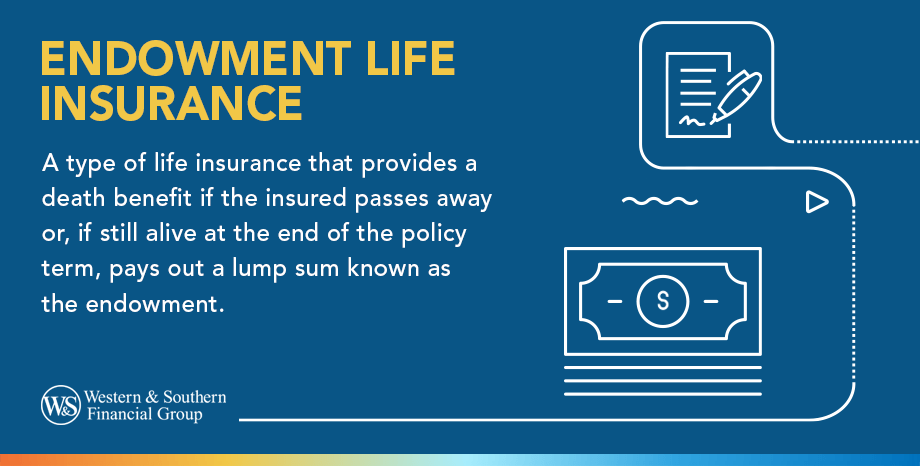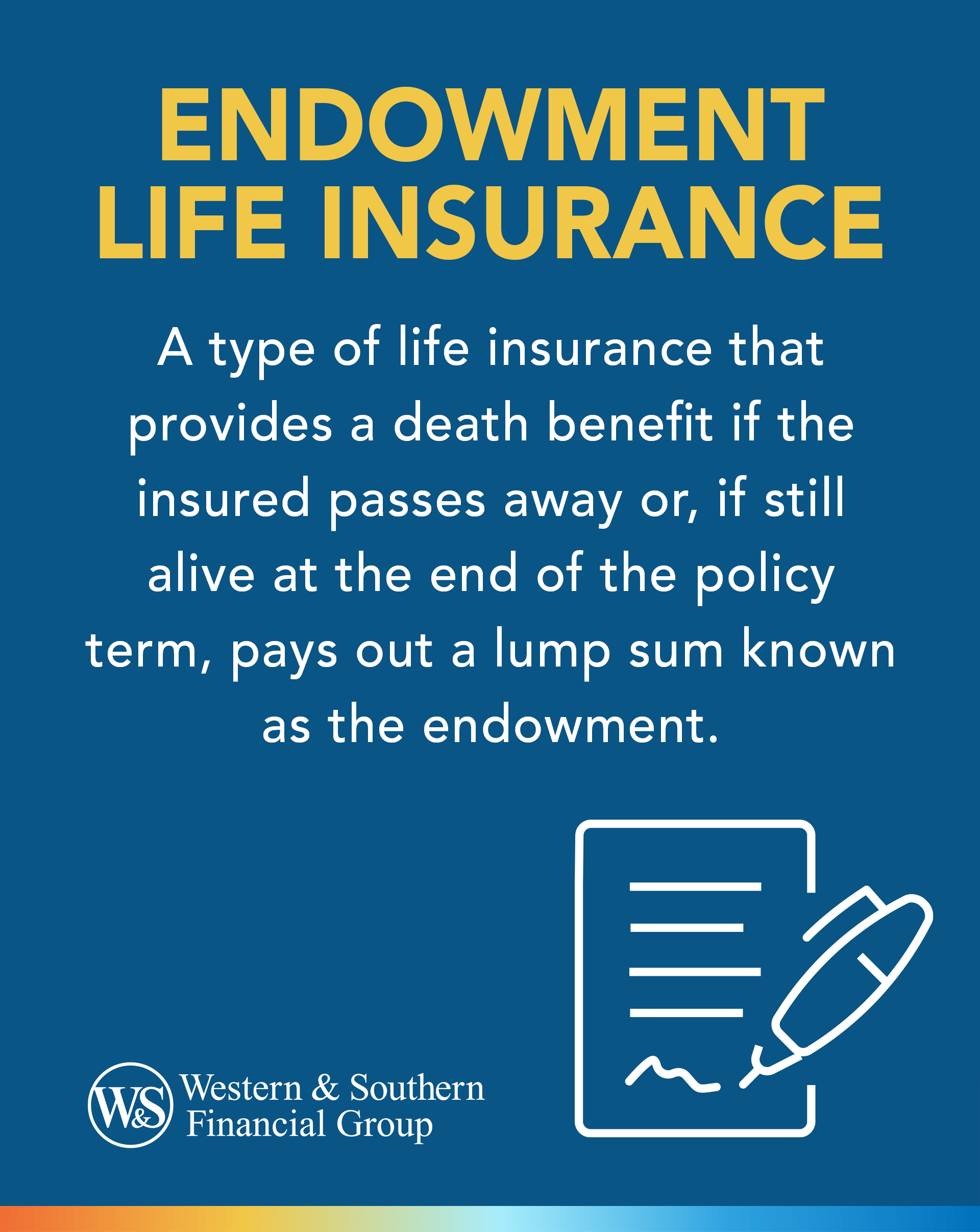

Table of Contents
Key Takeaways
- Endowment insurance is a life insurance that offers a death benefit and a guaranteed lump sum payout at the conclusion of the policy term, as long as premiums are paid.
- To fund the endowment, you pay premiums into a policy, and the policy's value grows over time. The amount you pay depends on how much you want to accumulate and how soon you want the money.
- Endowment life insurance policies can fit with any life stage and financial goals. Coverage is typically available when you're between the ages of 18 and 60.
Life insurance can provide valuable protection when you die, and some policies also offer benefits during your lifetime.
Endowment life insurance gives you coverage that can help you reach financial goals during your life while also providing protection if the unexpected happens. With these policies, you can design a strategy that helps your loved ones will have the money they need when major expenses arise.
Endowment Life Insurance Defined
Endowment insurance is life insurance that combines a component with a death benefit. The "endowment" is a specific amount of money you fund after a certain number of years if you're still living. But if you die prior to the policy maturing, the insurance company pays out the policy amount to your loved ones.
To fund the endowment, you pay premiums into a policy, and the policy's value grows over time. The amount you pay depends on how much you want to accumulate and how soon you want the money. You can spread out the payments with a long-term goal, helping to keep premiums low.
Ultimately, you can spend the money on anything you choose, but big financial goals might be a good fit. For example, some families use this payout to pay for a child's college, or you can design a policy that pays out when you reach your desired retirement age.
If you think this payout might make sense for your family, consider speaking with a financial professional about purchasing endowment life insurance.
How Do Endowment Policies Work?
The investment amount is determined by your own design and limitations within the policy. You could specify how much money you'll want to have and when you'll need it, and a financial professional can determine what your monthly premiums might be. Or you might review your budget and decide how much money you have available to put toward a goal. With that information, you can calculate exactly how much you'll receive at a future date.
Endowment life insurance policies can fit with any life stage and financial goals. Coverage is often available when you're between the ages of 18 and 60 (check with your insurance provider for details).
While there are benefits of using an endowment policy, it's wise to explore all of the alternatives and choose the option you consider best for you. For example, if you're saving for retirement, evaluate how retirement accounts like 401(k) plans and individual retirement accounts (IRAs) might help you accomplish that. Or, if you want to maximize the death benefit and minimize monthly premiums, a basic term policy might be appropriate (though note those aren't meant to pay out before your death).
Why Consider Endowment Life Insurance?
There are several reasons individuals might choose to purchase endowment life insurance policies:
Certainty
These policies offer predictability, if you pay your premiums. You can be confident that you or your loved ones will have a certain amount of money available in the future. Unlike investment accounts that fluctuate in value and can lose money, you can expect a guaranteed return in an endowment policy. As long as you pay into the policy as planned, the insurer guarantees payment of either a death benefit or a maturity payment.
Flexibility
You can use the money from an endowment policy for anything you want. While you might have a specific goal in mind when you get a policy, your plans could change, and that's okay. That's different from vehicles like 529 college savings plans, which might come with restrictions on how you spend the money.
Customization Opportunities
You can build a strategy that meets your needs and fits your budget. For example, if you have a newborn child, you might set the policy to mature in 18 years to coincide with their college expenses. Or you can design a strategy based on how much you can afford to save each month.
Accumulation
Having structure can help you reach your goals, and endowment policies can provide that structure. Knowing you have a set payment and a defined outcome established, you may be more likely to stay the course.
Insurance Designed for Financial Goals
Unlike standard permanent insurance policies, an endowment policy pays out when you think you'll need the money (at the time you choose). After that, you no longer pay premiums or insurance costs. Endowment policies provide a payout regardless of life, as long as you pay your premiums.
Are There Potential Drawbacks of Endowment Insurance?
Although there are several advantages associated with endowment life insurance policies, they may not be the right financial choice for everyone. There are a few potential disadvantages to consider:
Limited Protection
While this type of life insurance policy can offer valuable coverage and help you grow your savings, it only offers protection for a specific period of time. If you reach the end of your term and wish to extend your coverage, you'll need to purchase additional protection (potentially at a higher cost, due to your age and health status).
Generally Not Convertible
As mentioned, when your endowment life insurance coverage ends, you likely won't be able to renew or convert the policy. Your insurer may have unique rules around extending coverage in this way, so don't hesitate to inquire if you think you might find yourself in such a situation.
Only Generates Interest in Accordance With the Policy
Due to their low-risk profile, endowment life insurance policies typically don't generate much interest. Although the money you invest in a policy does earn some interest, returns are likely to be on the lower side.
Higher Premiums
Endowment life insurance coverage offers several benefits, but those advantages tend to come at a cost. Due to their design and terms, these policies typically have higher premiums than other types of insurance that offer a cash value component, such as permanent life insurance. It's important to consider the costs before purchasing this protection.
The Bottom Line
Endowment life insurance can help you save for future goals and have finances available to you when you need it. You get a custom-designed policy, and you have a clear structure in place to help you reach your goal. And if you die before you're able to complete the plan, an insurance company steps in to provide the endowment to your loved ones.
If you think endowment life insurance could fit into your financial road map, consider speaking with a knowledgeable financial professional to find out what it might take to fund your goals.













